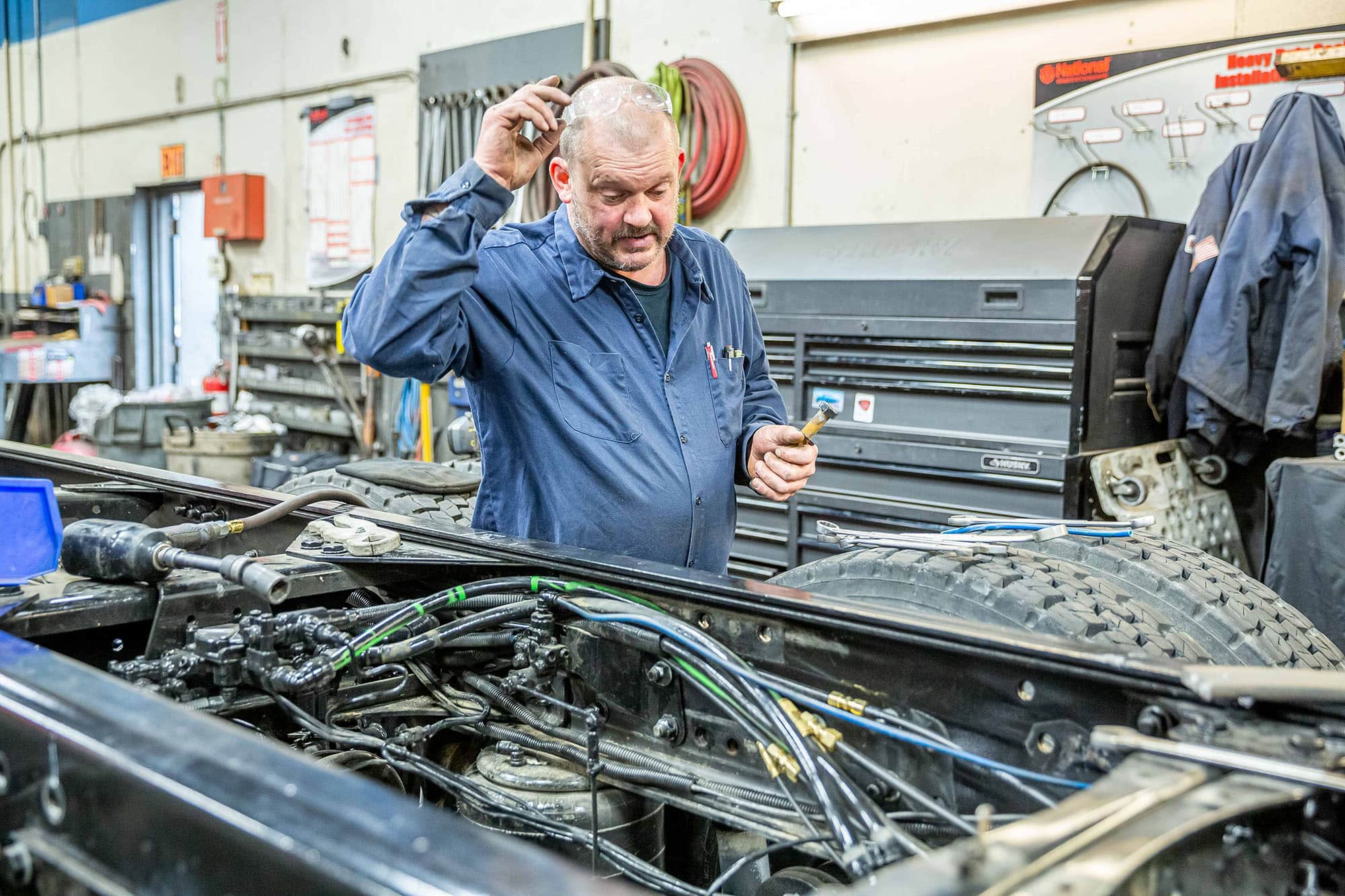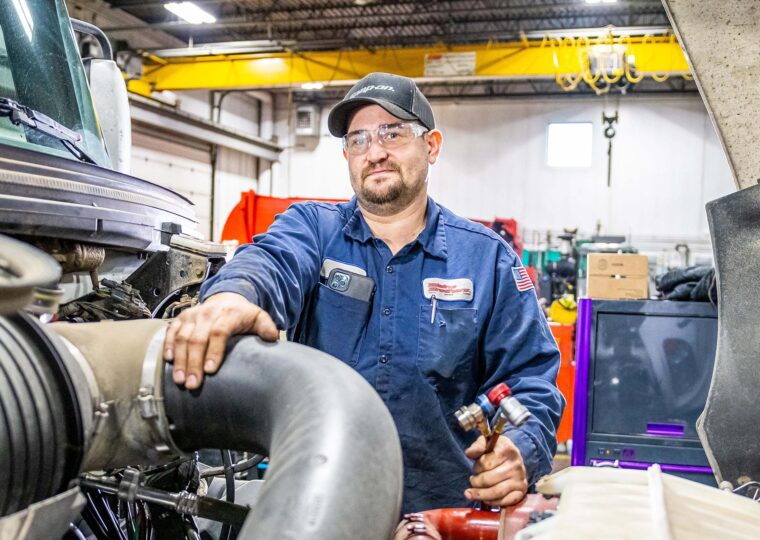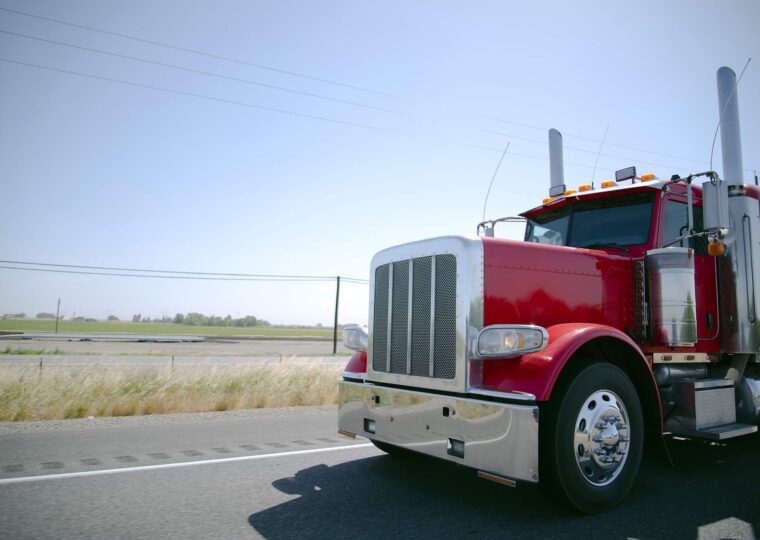Having an air conditioning system in your truck that works well is critical for any semi-truck operator, particularly during summer months or when driving in warmer regions. When your AC stops blowing cold air, it can be frustrating, but more than that it can be uncomfortable and even dangerous.
We’re going to take a look at what might cause your truck AC to stop cooling, and go over some of the troubleshooting steps that may help you get it working again. In the end, if you can’t get it working or simply want to avoid the hassle and downtime, we’ll point you toward a trusted, local resource with industry-leading technicians.
 Common Reasons for Air Conditioning Failure in Trucks
Common Reasons for Air Conditioning Failure in Trucks
1. Refrigerant Leaks
Loss of refrigerant is one of the most common reasons that your truck’s air conditioning stops working right. Having enough refrigerant is essential for two very important reasons. First, it is the medium that absorbs the heat from the air and transfers it outside the system. Second, it acts as an important lubricant for the compressor, and if the refrigerant level drops too much it can put extra stress on the compressor, causing it to wear prematurely or even fail. If your truck AC is not cold, the refrigerant level is one of the first things to check.
Refrigerant leaks happen for a variety of reasons, including worn components, corrosion, and vibration. Common locations where refrigerant leaks occur include:
- O-rings and seals: These rubber components are subject to wear and deterioration over time, which can cause refrigerant to escape.
- AC hoses: Damage to the hoses that connect portions of the AC system can lead to leaks and lost refrigerant.
- Compressor: A cracked or somehow damaged compressor housing can lead to refrigerant escaping.
- Condenser: Leaks are common in older condensers where the internals may have damage from corrosion or rocks.
- Evaporator: Generally located inside the cabin, a leaking evaporator can be challenging not only to diagnose but also to fix.
If you think you may have a refrigerant leak, here are some of the signs to keep an eye out for that may support that. Look for the following:
- Hissing or bubbling noises near the AC system, which is often caused by the leaking or bubbling sound as the air escapes.
- There is a visible, oily residue near where the leak is suspected.
- The AC system is taking longer to cool the area or only blows warm air.
To identify and fix a refrigerant leak, it’s important to work with a technician that can diagnose and repair the leak with specialized tools like electronic detectors or UV dye kits. Then they’ll empty the system, and recharge it with the appropriate refrigerant.
2. Failed Compressor
If the refrigerant is the lifeblood of your AC system, the compressor is its heart. The compressor pressurizes and circulates the refrigerant throughout the entire system. This crucial component is needed for the AC system to function properly, and a compressor that is failing or has failed already will stop your air conditioning from creating cool air. This is because there is no circulation, and heated refrigerant can no longer be moved between the evaporator and the condenser.
The most common compressor problems will include:
- Seized or locked bearings: Over time, the compressor bearings can begin to wear or seize. When the compressor cannot move, it will fail.
- Broken valves: The compressor has several internal valves, and if those valves become damaged, there can be a drastic reduction in the cooling ability.
- Insufficient lubrication: Compressors rely on lubrication to keep them from becoming damaged from friction or overheating, which both contribute to premature failure.
Here are three common signs that the compressor in your truck’s system needs to be replaced:
- When the AC is turned on, there are loud noises. These are sometimes described as grinding or knocking sounds from the damaged compressor internals.
- Warm air blowing out of the vents is a solid indicator that the compressor can no longer pressurize the refrigerant enough.
- The compressor’s clutch is responsible for turning the compressor on and off. If the clutch has gone bad, the entire compressor will need to be replaced.
If the compressor does need to be replaced, it can be a complex and involved job that requires specialized tools, and knowledge and is governed by many government regulations. It’s important to let a qualified technician handle the removal and replacement since they’ll be familiar with refrigerant safety and environmental regulations regarding material disposal. They’ll also be able to make sure everything is properly aligned and connected so that the chance of future problems is minimized.
3. Clogged Condenser
The condenser is needed to condense and cool the high-pressure, vaporized refrigerant back into a liquid. This process releases the cabin heat that was absorbed by the refrigerant. The condenser is generally placed at the front of the truck, and it relies on large amounts of airflow and the AC system’s ability to dissipate heat effectively. When the fins of the condenser become clogged or obstructed by rocks, dirt, insects, or other debris, it can diminish the ability of air conditioning to cool the cabin.
Learning to recognize a clogged condenser can help identify when service is needed, and it can help prevent additional damage to components like the compressor. Two of the biggest signs of your condenser becoming clogged are:
- A reduction in cooling efficiency, due to the greater restriction on airflow through the condenser, can lower the system’s cooling capacity, meaning more warm air from the vents
- Overheating the compressor due to poor heat dissipation by the condenser causes the compressor to overheat, which can reduce the AC performance.
The easiest way to resolve this issue is to start visually inspecting the condenser for any visible debris or damage. If there is a build-up of debris the condenser fins can be cleaned, with some compressed air or a soft brush, just be mindful to not bend or damage the fins. Some cases will require the condenser to be replaced if it has become too badly damaged.
 4. Faulty Cooling Fans
4. Faulty Cooling Fans
Fans play an important part in the efficiency of your truck’s air conditioning system by helping cool the refrigerant down before it’s returned to the evaporator. If the fans fail, the condenser can’t get rid of the heat which the refrigerant collects. This causes your truck to blow warm air.
Some of the signs of cooling fans that are failing include:
- A drop in AC performance when idling or when operating at low revs. Cooling fans are more important in these conditions since there’s limited airflow.
- Fans that aren’t spinning enough when the engine and AC are on will not provide enough heat dissipation for effective AC operation
- Since the cooling fans help the engine as well, there may be a risk of overheating if those fans do not come on again.
When searching for reasons why your cooling fans may not be working, check for damaged wiring and loose connections. Also, be sure to check for blown fuses that may be interrupting power. There may also be a problem with the fan motor or the whole fan assembly, in which case they’ll need to be replaced completely.
Trust Blaine Brothers To Get Your AC Blowing Cold Again
If the AC in your truck is no longer putting out cold air, there are several reasons why. Diagnosing the problem correctly is essential for making sure your downtime is minimized and that your time and money aren’t wasted. Blaine Brothers understands the importance of being able to operate in a comfortable cabin, so reach out today to schedule your air conditioning repair appointment in Minnesota or Wisconsin!


 Common Reasons for Air Conditioning Failure in Trucks
Common Reasons for Air Conditioning Failure in Trucks 4. Faulty Cooling Fans
4. Faulty Cooling Fans